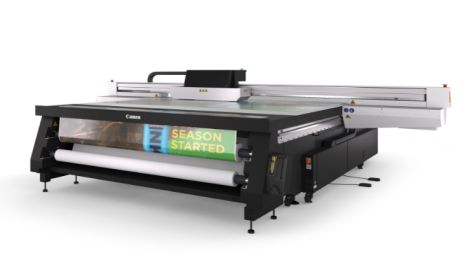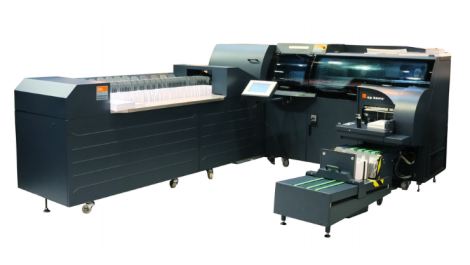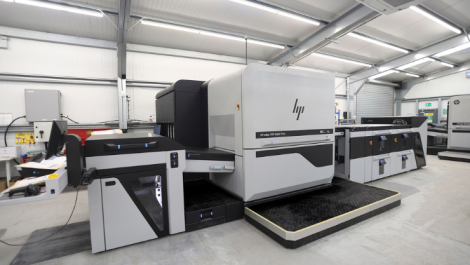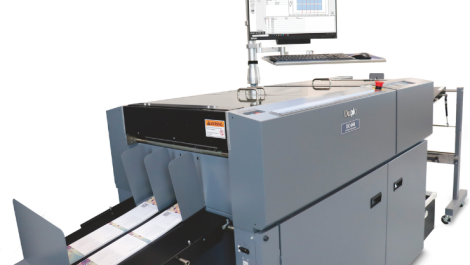Rob King (right) of Altaimage with LumeJet’s Miles Bentley and the world’s first LumeJet S200.
London firm Altaimage took the world’s first LumeJet system on beta and bought it two months later. Digital Printer was the first magazine to visit.
It takes little more than a minute for Digital Printer to breathe a wide-eyed wow, and Rob King grins in the knowing way of a man who has just seen a nailed-on prediction come true. ‘That word is the first word that everyone says,’ he explains.
A selection of printed samples are on the table at Mr King’s production agency Altaimage, close by Canary Wharf. The one that has caused the exclamation of admiration is a photobook for an Indian wedding, alive with rich colours, and beautifully finished too. There are others too: stylish corporate pitch books, and a fine art piece where the brush strokes, laid on thick, seem to rise out of the page.
Rob King has spoken glowingly in the recent past aboutthe standard of printed output from the LumeJet S200 press, which he is the first in the world to have, and he is about to do so again.
‘We’ve tried it next to CMYK and it is chalk and cheese. The LumeJet pulls out every single piece of detail. You would not believe it until you see it. It’s great for jewellery and flesh tones. The greys are stunning; I haven’t seen anything that can produce anything like it. The print is so superior to what I see out of a CMYK device that it’s very difficult to think of a negative.’
The irony, just in case you have not been following the development of this British technology, is that the LumeJet is not actually printing anything. It uses a ‘photonic imaging’ process in which RGB light beams activate silver halide grains in the media. The result is print quality equivalent to 8000 dpi inkjet production, the manufacturer claims. The technology was developed by a team from Warwick University and is now in the early stages of commercialisation.
Altaimage took the first beta device in July 2013 for a three month period, and decided to purchase the machine after just two months. ‘It seemed the right thing to do,’ he said. ‘They kept the press in Coventry (where LumeJet is based) for such a long time and tested it and tested it, so that when it came out it was ready to go.’
The interesting thing is that day to day use of the LumeJet has quite significantly changed the way that Altaimage saw it fitting in with its client base. The original plan was to target the fine art sector, but though these people have liked the printing, they have been less keen on the glossy papers that the company is currently running. Mr King revealed that certain matt materials are being tested on the LumeJet that might be preferable to the fine art world. It is also testing a pearl paper, which is ‘spectacular – nothing touches it’, he added.
‘I thought it would be fine art, but until we test some more papers we are finding a market in bids and tenders, presentations and photobooks, although photobooks are not where our core business is. This is such a professional end printing machine that you need a professional person to understand what it can give you. Someone buying a book off the internet will not understand the difference. If you’re doing photobooks then you are trying to hit a target to fulfil what everyone else is doing. This is not what everyone else is doing. This is something a little bit special.’
In keeping with the quality of output, these are premium products and Altaimage charges for them accordingly. New doors are opening, behind which are printed jobs that the company was not previously aware of. Jobs such as bids and tender documents and bespoke short run presentation books are perfect for the LumeJet. It can also print onto a one metre long substrate, and this combines well with panoramic images for customers such as architects and estate agents.
‘That’s a market that we hit upon,’ said Mr King. ‘There’s an app on the iPhone that my son showed me, where the phone does a 360 degree turn taking a picture.’
Aside from recycling of silver, the LumeJet S200 seems to be environmentally harmless, with fixer and developer solutions neutralising each other so that they can go down the drain; these solutions are not expensive either, at around £20 per 20 litres. The continuation of Altaimage’s plan will see further attempts to win over the fine art sector, the seeking of partnerships with larger organisations, even brands, to spread the LumeJet word, and the establishment of a US office to test the market across the pond. From LumeJet itself, additional customer announcements are expected soon.





